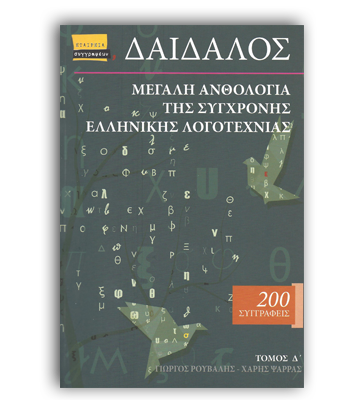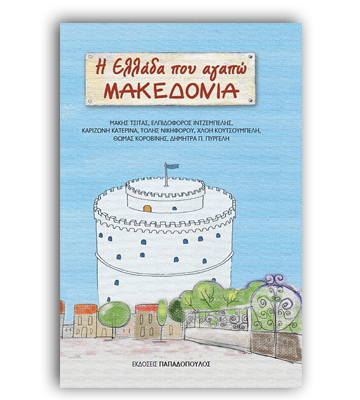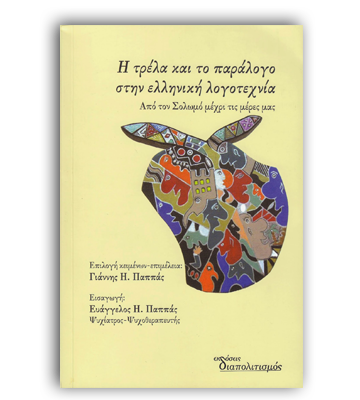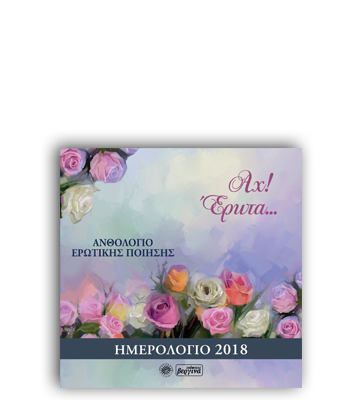MICROWAVES
99 1 short stories from members of the Hellenic Authors’ Society
Efimerida ton Syntakton & Hellenic Authors’ Society | 2019
 The Hellenic Author’s Society welcomes 2019 with a collection of 99 1 short stories from its members, available in the Saturday, Jan. 5 2019 edition of the Efimerida ton Syntakton newspaper. The book, with 100 humorous anecdotes of no more than 555 words, a foreword and introduction, is one of the publishing initiatives of the Hellenic Author’s Society and which includes an annual poetry calendar, thematic books and anthologies comprising works of its members.
The Hellenic Author’s Society welcomes 2019 with a collection of 99 1 short stories from its members, available in the Saturday, Jan. 5 2019 edition of the Efimerida ton Syntakton newspaper. The book, with 100 humorous anecdotes of no more than 555 words, a foreword and introduction, is one of the publishing initiatives of the Hellenic Author’s Society and which includes an annual poetry calendar, thematic books and anthologies comprising works of its members.
Microwaves, collected works by the Hellenic Authors’ Society
99 1 short stories from members of the Hellenic Authors’ Society
Foreword by: Giorgos Chouliaras. Introduction by: Iro Nikopoulou
ISBN 9786185334246
Calendar 2019 About patience
Ianos Publications | 2019
This calendar is a collection of excerpts from literary works of both Greek and non-Greek writers. In includes texts authored by various thinkers, lyrics of favorite songs, stanzas of beloved poems, but also stories from children’s books -- all of which address the issue of patience.
The calendar includes works from C.P. Cavafy, Giorgos Seferis, Franz Kafka and William Shakespeare. And from Epictetus, to Antoine de Saint-Exupéry, to Alexandros Papadiamantis, to Jorge Bucay, all of the authors talk about patience, a word that is vastly misunderstood.
Dedalus: The Great Anthology of Contemporary Literature
Efimerida ton Syntakton newspaper & Hellenic Authors’ Society | 2016
In the preface to this publication the General Secretary of the Hellenic Authors’ Society, Angeliki Stratigopoulou emphasizes that the anthology, “blooms across thousands of years, and, therefore, is not something unprecedented; on the contrary, it is a form that is becoming more and more popular, especially in our digital times, marked as they are by ease of access to information.” And she adds: “The anthology is a luxurious version of the archive. Thanks to their incestuous relation, an anthology can exist within an archive, but the contrary might also be the case. As a concept, it coexists with a collection as well, which is to say with the collectors too, in terms of the aesthetic choice of its content.”
The Greece that I Love-Macedonia – Μακεδονία
Papadopoulos Publications | 2014
The book The Greece That I Love – Macedonia contains stories full of nostalgia and optimism that help us mentally travel to… an unknown Macedonia. It contains the following short stories:
• In Football Fields with My Dad by Makis Tsitas
• The Electrophone by Elpidoforos Intzempelis
• The Treasure House by Katerina Karizoni
• Eurikleia by Chloe Koutsoumpeli
• The Element of Yenti Koule by Thomas Korovinis, and
• Without a Flaw by Dimitra Pirgeli
The anthology is a part of the series The Greece That I Love by Papadopoulos Publications.
Madness and the Irrational
Diapolitismos Publications | 2014
Contemporary science recognizes a double meaning for the word ‘madness’. On the one hand, madness is a world that deeply differs from that of “healthy” people, while on the other, the word reveals something that is inherent to all human beings. Recognizing this reality means exercising respect for The Other, but also reaching a greater understanding of oneself.
The history of madness begins between the 15th and 16th century: Michel Foucault reconstructed it in his exemplary study Madness and Civilization: A History of Insanity in the Age of Reason. Through this work, which was initially published in 1961 as a doctoral dissertation and reissued in 1972, the French philosopher and historian attempts to interpret madness, which begins from “ground zero of the history of madness, at a time when it is still an undifferentiated experience”; to its medical definition and treatment through confinement; to its emergence as a means of differentiating between healthy and unhealthy people – the mad – who cease to be bearers of sacred knowledge and become the pariahs of society. Already from the period of the Enlightenment, madness is distinguished from rationality; and in the Age of Reason rationality eclipses all other forms of expression, especially the non-rational, its polar opposite. Foucault’s work explores the historical conditions that precipitated this duality, it studies the circumstances that gave rise to the development of psychiatry and psychology, and it analyzes the decline of the previous regime of institutional confinement and the emergence of asylums towards the end of the 18th century. For it was then that mad people were “exonerated” of their madness and became “patients” instead.
In both antiquity and the Middle Ages, madness has no autonomous presence and is interwoven with the manifestation of the sacred. Its everyday coexistence with the magical-theological dimension of reality established a profound relationship between madness and divine or demonic powers. An example of this is the so-called “mania” of the Mainades in Greek mythology: nymphs who presented themselves as companions and escorts of Dionysus and danced in a frenetic and orgiastic manner. Both Euripides and Sophocles have dealt with madness in Bacchae and Ajax respectively. Real madness in antiquity was the rejection of the divine law, the transgression of the limits placed by man and the consequent mockery of divine mystery. In the Middle Ages, the mad person was at the margins of society, because in his/her face one could discern a sign from God. Madness, therefore, was either sent by God or the Devil.
Some of the oldest and most exceptional Greek writers who dealt with madness are: Dimitrios Vikelas, Argyris Eftaliotis, Alexandros Papadiamantis, Georgios Viziinos, Dimitrios Kampouroglou, Ioannis Kondilakis, Pavlos Nirvanas, Michail Mitsakis, Dimosthenis Voutiras, Kostas Paroritis, Giorgis Zarkos, as well as others. Several more contemporary writers have also written about madness, such as Sotiris Papatzis, Andreas Fragias, E.C. Gonatas, Leia Chatzopoulou-Karavia, Nikos Dimou, Diamantis Axiotis, Manolis Praktikakis, Maria Kougioumtzi, Nikos Themelis, Tasos Kaloutsas, Giorgos Romanos, Nikos Katsalidas, Ilias Gris, Niki Troulinou, Sotiris Pastakas, Iro Nikopoulou, Elpidoforos Intzempelis, Lila Kanomara, Sophia Nikolaidou, and Makis Tsitas.
The first Greek novelist to deal with the topic of madness in his work is our national poet, Dionysios Solomos. In his early poem “The Mad Mother,” he describes the anxiety of a mother who has lost two of her children and is desperately looking for them in a cemetery in the middle of the night. Several more poets have dealt with madness and the irrational in their poetry, including: Kostis Palamas, Maria Polydouri, Giannis Ritsos, Miltos Sachtouris, Tasos Livaditis, Giannis Dallas, Giorgis Pavlopoulos, Manolis Anagnostakis, Nikos Karouzos, Titos Patrikios, Zoe Samara, Angeliki Sidira, Lefteris Poulios, Michalis Ganas, Vasilis Ladas, Giorgos Douatzis, Giorgos Markopoulos, Antonis Fostieris, Tasoula Karageorgiou, Alexandra Bakonika, Christos Papageorgiou, Giannis Tzanetakis, Giorgos Kozias, Alexis Stamatis, Sakis Serefas, Eftichia-Alexandra Loukidou, Dimitris Kosmopoulos, Vasilis Rouvalis and Aristea Papalexandrou.
The present anthology is the most comprehensive and most representative amongst the several that have been published on this topic. Its originality rests on the fact that, to this day, it is the first time anyone has collected 38 texts in prose and 30 poems in a single volume. The works have been arranged chronologically, allowing us to observe the presence, evolution and development of works on madness and irrationality in contemporary Greek literature, from the previous century to the present day.
The book is illustrated with several compositions, all of which are the work of painter and psychiatrist Pavlos Vasiliadis.
Bridges, Calendar 2015
Patakis Publications & Hellenic Authors’ Society | 2015
“For 22 years now, the Hellenic Authors’ Society (HAS) has published topic-specific calendars with the support of many publishing houses. This year HAS builds bridges through the craftsmanship of 80 of its members, who contributed to this publication with either published or (for the most part) unpublished poems and texts, as well as through the photos of prominent photographer Andreas Smaragdis, most of which were captured exclusively for this publication.
“We use the symbol of a bridge to highlight the process of bringing together, as a kind of architecture for reconciliation or crossing, as a ceremony of union between two sides.
“We have the bridge as technology, as literature, and as alphabet, as memory and as expectation, as a closure of the gap and as an upcoming step.
“We begin with the Bridge of Arta and move towards the Charilaos Trikoupis Bridge that links Central Greece to the Peloponnese, walking on the stretched wire ropes of language.”
--Dimitris Kalokiris, President of the Hellenic Authors’ Society, in the foreword.
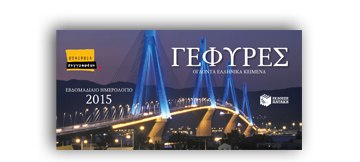
Difference
Olive and Oil Museum of Pilio | 2015
Loci of Literature
Kastaniotis Publications & Hellenic Authors’ Society | 2015
The aim of this publication by the Hellenic Authors’ Society (HAS) is to underscore the relationship between our contemporary literature and geography. The topic is approached as a kind of “knowledge homeland”; as a modern geography of our contemporary writers, having as its axis not necessarily their place of origin, but rather some other Greek longitude and latitude that defines them (or stimulates them) as creators. With this book, HAS has created an atlas of personal wanderings, regardless of the writer’s generation or ideological orientation.
Through original texts or excerpts from their published works, 134 authors mark their presence in these collected works. Despite rapid urbanization and abandonment of the Greek countryside during the inter-war period, the loci and landscapes continue to play an important role in the authors’ works, for they function as a living point of reference, as a source of memories, as places of paternal narratives, as a location for revisiting and inventing the past. The diversity of writing styles, as well as the use location (ranging from the place of origin of a narrative hero or backdrop for a story) is apparent, and it offers a fresh spatial dimension to Greece’s dynamic literary scene.
Passions in Literature
Kastaniotis Publications & Hellenic Authors’ Society | 2016
After the very successful publication of Loci of Literature, the Hellenic Authors’ Society continues with a second volume entitled Passions in Literature. One hundred authors record and rethink, through their own unpublished or published texts, in newspapers and literary magazines, passions of every kind. They record and rethink passions secret and revealed, unconfessed obsessions and habits from which humans both suffer and find nourishment, in which we find both consolation and inspiration, and in which we fester and are confined. They write about passions that, at times, offer to human beings an illusory expansion of the senses and an occasional vastness of emotions, while at times they just plunge us into a fictitious private cosmos, relieving us temporarily of our insufficiencies, as well as of our existential anxiety. Insecurities, a flattening everyday life, the anxiety of death, loneliness… to all these things a passion seems to be a temporary remedy.
After all, all the narratives human beings have to offer revolve around passions; passions that they describe, express, try to understand or tame.
From ancient mythologies to the holy books of religions, to contemporary literature, which now finds extremely personal ways to touch upon the destructive imprint of our origin, which can bring into the light of the simple electric lamp – at times seeking Another Light – the bleeding hand, the disfigured self, and which creates literature by daring to record, passions have always been the current of narrative.
Unexpected Fairytales
Efimerida ton Syntakton & Hellenic Authors’ Society | 2017
Unexpected Fairy Tales, is a collection of works by novelists and poets, all members of the Hellenic Authors’ Society (HAS), and are dedicated to the memory of former Society President Errikos Belie – a translator and poet par excellence – who met an untimely death last year.
As one can perhaps imagine from the title of this collection, the texts included are not the well-known fairy tales of tradition, but fairy tales that… will surprise the readers as much as the authors who conceived them. As Society President Giorgos Chouliaras humorously remarks in his foreword: “the indefinable border that separates contemporary fairy tales from ancient myths could be described as the fairy tale line.”
Society General Secretary Angeliki Stratigopoulou adds in her introduction that: “the horror stories of the book which you hold in your hands… do not suffer – fortunately – from uniformity. They are written with originality and, most of all, with conviviality and appeal to children and adults alike.” Further, “the members of HAS who participated in this collected volume, are not necessarily experts on children’s books. The spectrum of these fairy tales […] ranges from tradition to didacticism, with several stops in between that include the irrational, the metaphysical, the postmodern, the poetic, and the historical worlds.”
Oh! Love… Calendar 2018
Vergina Publications | 2018
The poems included in the publication Oh! Love… Calendar 2018: An Anthology of Love Poetry have been chosen by the poet and publisher of the literary magazine Keleno, Panagiota Christopoulou-Zaloni, and the team of editors of Vergina Publications.
It contains a love poem for each and every day of the year, composed by either a contemporary or classical poet.
